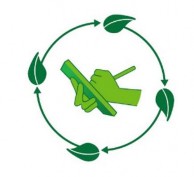How do we assess pavement sustainability?

Sustainability measurement is an evolving area of research within both the pavement and transportation fields, as it is in other areas as well (e.g., consumer products). The main reasons to measure sustainability include: (a) achieving sustainability and performance goals, (b) accounting mandates, (c) decision support, (d) process improvements, and (e) addressing existing concerns that detrimentally impact pavement performance.
In addition to performance measurement, three other general measurement tools, or methods, tend to be used either in isolation or in concert to quantify various aspects of sustainability: life-cycle cost analysis (LCCA), life-cycle assessment (LCA), and sustainability rating systems. Ultimately, the priorities of the owner/agency and the characteristics of the project, as well as the desired outcome viewed within the context of larger systems will determine the most suitable assessment approach.
Life-Cycle Cost Analysis
Life-Cycle Cost Analysis (LCCA) is an economic analysis that is used to evaluate the total cost of an investment option over its entire life. LCCA is useful for determining the economic impact of potential changes in design, construction, materials, etc. that are intended to improve the environmental or societal impacts of a pavement project.
Like most analytical tools, LCCA is not without limitations and, if used incorrectly, can provide false support for poor choices. The accurate estimation of the timing and costs of life-cycle activities is the most important factor in conducting a good pavement LCCA. Other considerations that are also important include: selection of discount rate, end-of-analysis residual value, user cost estimates, and the use of deterministic vs. probabilistic LCCA.
The most widely accepted and adopted LCCA tool for pavement applications currently in use in the U.S. is the FHWA's RealCost Software. Originally developed as a relatively simple proof-of-concept, spreadsheet-based program for use in LCCA workshops in 1997, it has undergone numerous improvements and enhancements over the years and is routinely used by pavement design practitioners throughout the country.

Life-Cycle Assessment
Life-Cycle Assessment (LCA) is a structured evaluation methodology that quantifies the environmental impacts over the full life cycle of a product or system, including impacts that occur throughout the supply chain. Though standards exist, specifics on how to interpret and apply the general rules have proven to be varying from one application to another. To encourage consistency and adoption of pavement LCA's, FHWA has developed a LCA framework specific to pavements which provides technical guidance on the overall approach, methodology, and system boundaries.
At the material level, consistency is encouraged through a more formal process through Environmental Product Declarations (EPDs). An environmental product declaration (EPD) is an LCA of a product that follows a set of industry specific rules, the product category rules (PCR). Like an LCA, an EPD shows the environmental performance of a product in terms of environmental and resource use impacts such as energy use, air pollution, and ozone layer depletion.
One challenge to defining specific standards for conducting LCAs is that many product system boundaries are crossed or intertwined. Whenever a system of production yields multiple products or services, referred to as co-products, the environmental inputs and outputs of the system have to be assigned or allocated to each product and service. For example, asphalt is one of many co-products produced in oil refineries.

Sustainability Rating Systems
A sustainability rating system is essentially a list of sustainability best practices with an associated common metric. This metric usually points and quantifies each best practice in a common unit. In this way the diverse measurement units of sustainability best practices (e.g., pollutant loading in stormwater runoff, pavement design life, tons of recycled materials, energy consumed/saved, pedestrian accessibility, ecosystem connectivity, and even the value of art) can all be compared.
There are several sustainability rating systems relevant to pavements in some way although none of them focus solely on pavements. For example, FHWA's INVEST (Infrastructure Voluntary Evaluation Sustainability Tool) is a web-based sustainability rating system comprised of sustainability best practices, which cover the full life cycle of transportation services, including system planning, project planning, design, and construction, and continuing through operations and maintenance. FHWA developed INVEST for voluntary use by transportation agencies to assess and enhance the sustainability of their projects and programs.

